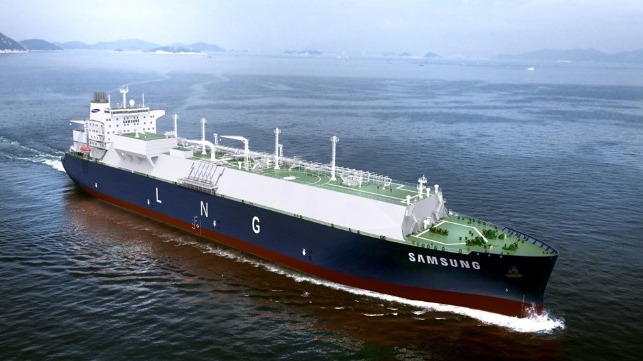Samsung to Develop Fuel Cell Powered Ships Starting with LNG Carrier

Samsung Heavy Industries and a U.S. fuel cell company Bloom Energy signed a joint development agreement to design and develop fuel cell-powered ships. SHI and Bloom Energy have a target to present the design to potential customers in 2022.
This current effort will seek to develop designs for an LNG carrier powered by fuel cells following the companies’ previous work with fuel cell-powered tankers. In September 2019, Samsung became the first shipyard in the world to receive an approval in principle by DNV GL for a fuel cell-powered Aframax crude oil tanker. The tanker was also developed in cooperation with Bloom Energy.
“By signing this joint development agreement, SHI has a plan to develop eco-friendly ships that will lead the future of the industry,” said Mr. Haeki Jang, vice president of shipbuilding & drilling sales engineering at SHI. “Our goal is to replace all existing main engines and generator engines with these highly efficient solid oxide fuel cells to align with the International Maritime Organization’s 2030 and 2050 environmental targets.”
The two companies will work together to realize their vision of clean power for ships and a more sustainable marine shipping industry. Samsung will take an active role in all stages of the project from the early studies to project completion, while Bloom Energy is creating a dedicated, cross-functional team of engineers to adapt Bloom Energy’s Servers to the unique requirements of the marine environment. Following commercialization, the two companies anticipate that the market for Bloom Energy Servers on SHI ships could grow to 300 megawatts annually.
According to the companies, their efforts to develop clean power will help to achieve the International Maritime Organization’s mandate to meet emissions reduction targets by 2050. Because the fuel cells create electricity through an electrochemical reaction, without combusting the fuel, these ships would be able to improve air quality with a reduction of particulate emissions, including NOx and SOx, by more than 99 percent, and shrink carbon emissions.
“The marine shipping industry has the ability to make a substantial impact on emissions and air quality at ports and across our planet,” said KR Sridhar, founder, chairman and CEO of Bloom Energy. “We see a collaboration with one of the world’s largest shipbuilders, SHI, as a moment to make measurable strides in reducing emissions and extending our mission for clean, reliable energy to the seas.”
